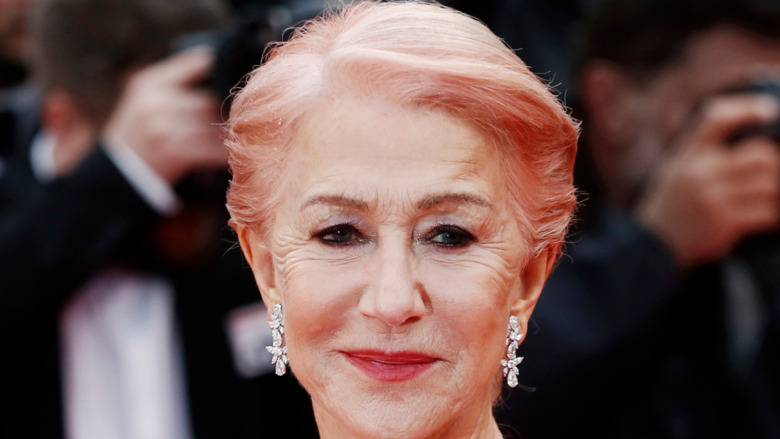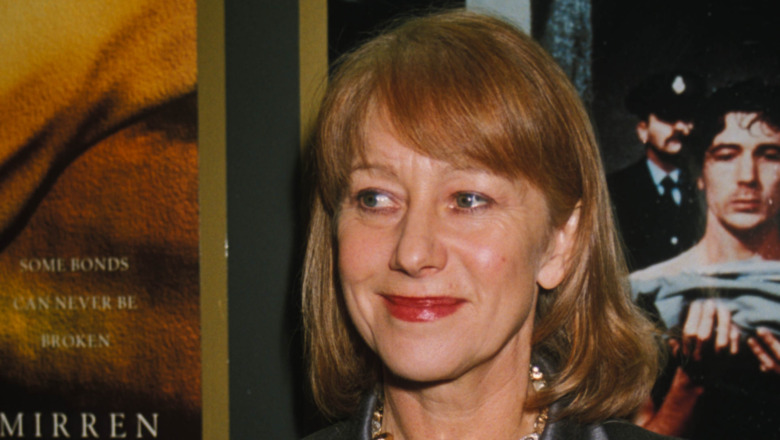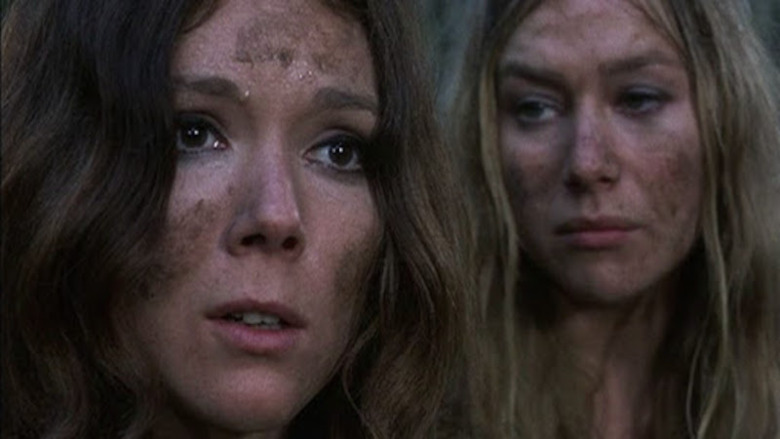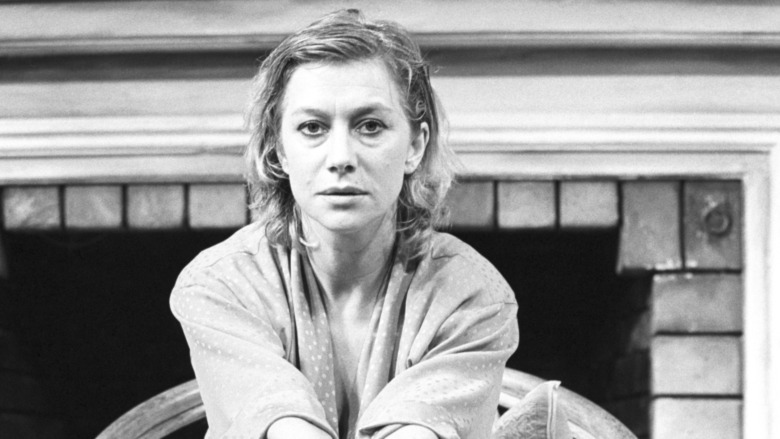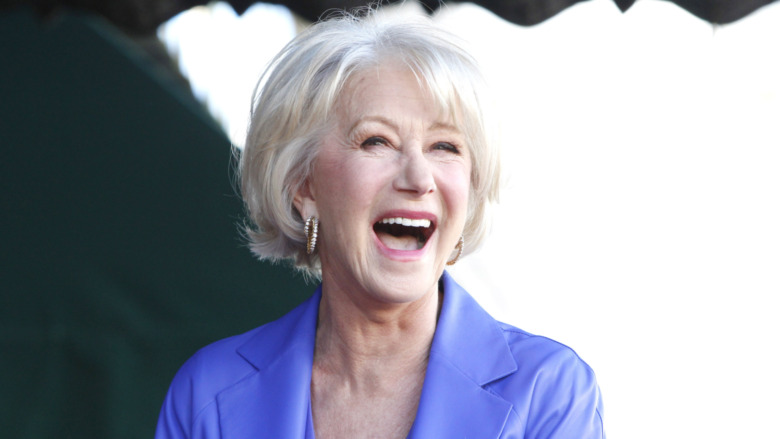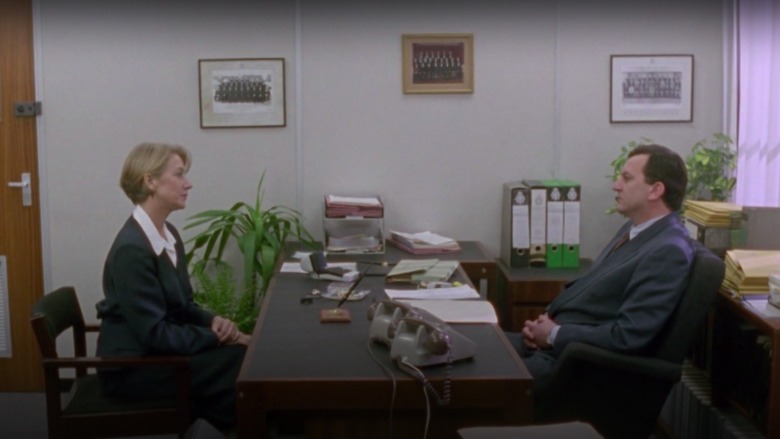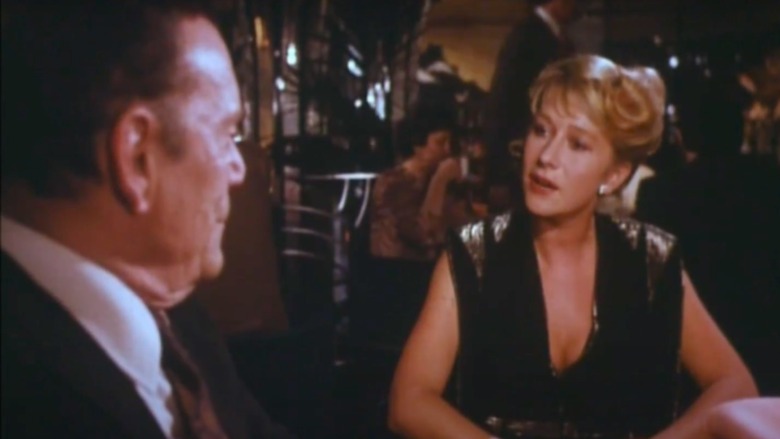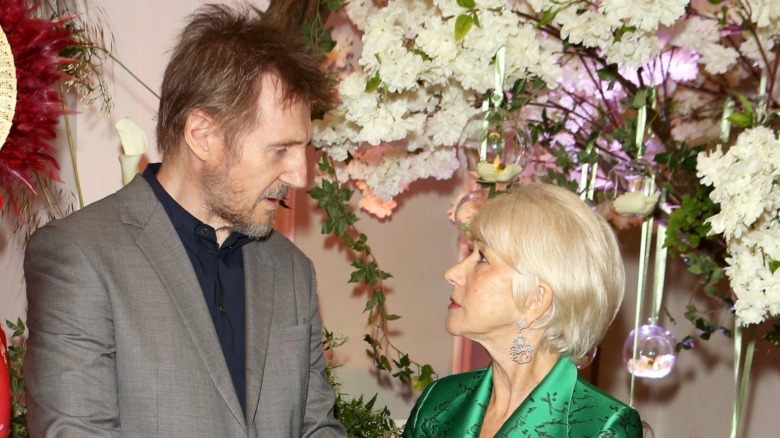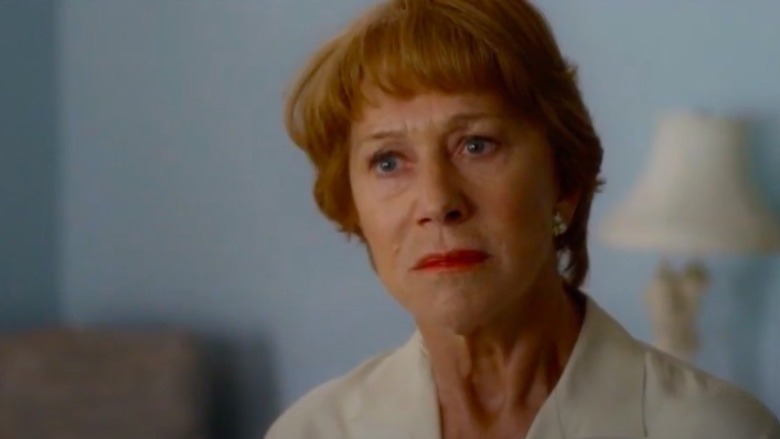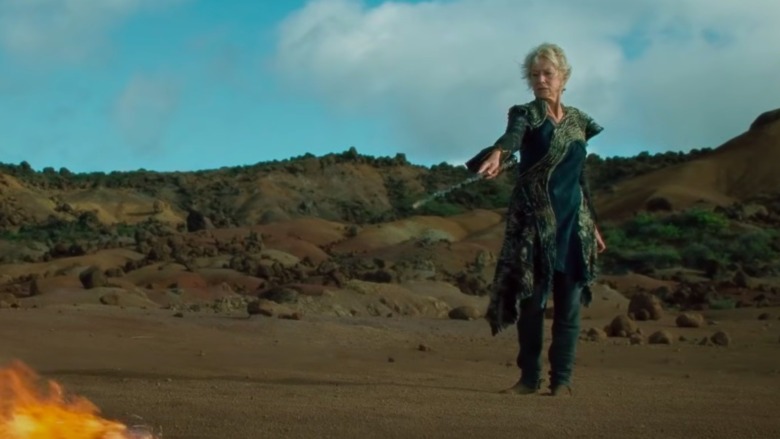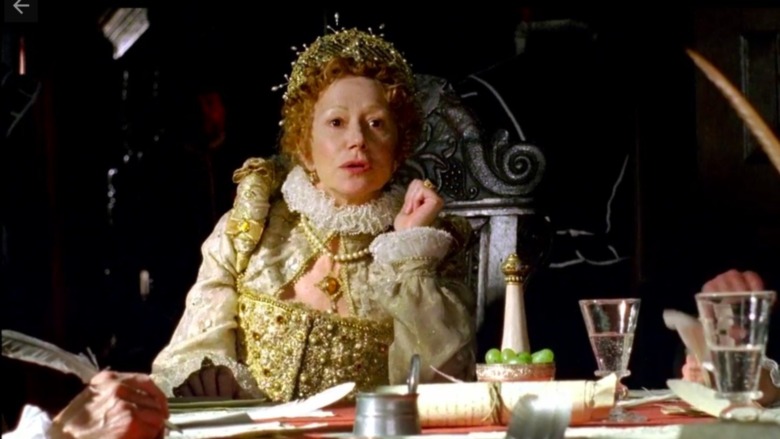The Untold Truth Of Helen Mirren
Helen Mirren can be considered one of the best actors out there right now — if not of all time. In her decades-long career, she's taken on roles across every acting medium: film, television and theatre. All the while, she's gained a multitude of nominations in each, including several wins.
Although she had been appearing in movies since the late '60s, Mirren rose to her modern level of prominence as the lead in "Prime Suspect," a police procedural drama that ran for 7 seasons. By the time "Prime Suspect" began airing in 1991, Mirren had begun gathering momentum with other roles, most notably 1995's "The Madness of King George," for which she earned her first Academy Award nomination.
Mirren has played a wide range of characters, but has become somewhat known for her portrayal of royal figures. She's actually played a royal of some kind seven times — besides the most notable roles of Queen Elizabeth II in 2006's "The Queen" and the titular royal in the 2005 historical miniseries "Elizabeth I," she's also portrayed Roman Empress Caesonia in 1979's "Caligula," Queen Charlotte in "The Madness of King George" and provided the voice of queens in two animated films, "The Snow Queen" in 1995 and Queen Tuya in "The Prince of Egypt." Most recently, she portrayed the empress regnant of Russia, Catherine the Great in a miniseries bearing her name.
Sure, Mirren isn't a queen in real life — but she did receive damehood in the UK in 2003 (via azcentral). If you're curious about the life and career of Dame Helen Mirren, continue reading for her untold truth.
Mirren is related to Russian nobility
Not only has Mirren played a royal several times, but she actually has ties to nobility herself.
Mirren — whose given birth name is Elena Lydia Mironoff — was born in the summer of 1945 to a Russian aristocrat named Vasily Petrov Mironoff and an Englishwoman by the name of Kathleen Rogers (via Nation's Memorybank). But, Mirren's father's ancestry runs deeper and is more intricate than his aristocratic status, with ties to nobility. As reported by a profile of Mirren in the New Yorker, Vasily's grandmother was a countess whose family is mentioned in the classic novel "War and Peace" by Leo Tolstoy. Vasily moved to the UK with his father when he was just two years old, where he lived his whole life.
Mirren took on a role connected to her Russian roots in 2019 with "Catherine the Great." She says her Russian heritage is quite distant to her — although she fits in among them. In a discussion with Interview Magazine, when asked if she feels Russian, Mirren responded, "Only when I'm in Russia. People come up and ask me for directions."
"Hamlet" sparked her love of acting
All actors have their own personal story of when they knew they wanted to pursue acting as a living. Mirren, who got her start in theater, credits a production of Shakespeare's "Hamlet," which she saw performed at a young age, as playing a major part in sparking her desire to spend her life acting — even though the amateur production didn't hold a ton of merit. She told the Guardian, "I walked out of that theatre at the end in another world. It's such an amazing thriller, though I don't suppose it was a very good production."
This early age experience is the source of her ardent belief that kids "shouldn't be taught Shakespeare" in schools. But rather, she adds, "They should experience it first by seeing a great production."
Over the course of her career, Mirren has acted in Shakespeare productions — either on stage or on screen — time and time again. In 1970, she even acted in "Hamlet" as Ophelia at The Royal Shakespeare Theatre in Shakespeare's hometown, Stratford-upon-Avon and at The Roundhouse in London.
The role that Mirren says started her career
Speaking of Shakespeare, Mirren's deep connection to the Bard runs deeper than her early age viewing of "Hamlet." In her autobiography, "My Life in Words and Pictures," she discusses her time working with the National Youth Theatre, a UK arts organization for young people (whose alumni include such actors as Daniel Day-Lewis, Daniel Craig and Rosamund Pike), where she acted in several Shakespearean plays with one in particular standing out.
Mirren writes that she was asked to play the lead role of Cleopatra in "Antony and Cleopatra" during her third year at National Youth Theatre — a role that she declares ultimately "launched [her] career." However, the payoff didn't come without its challenges, which she also detailed, writing, "I had to overcome my toxic mix of a great physical shyness and a palpable physical presence. I was in an environment full of testosterone and chaotic male hormones, and the word sexist had not yet been invented. I was in at the deep end."
Despite the hurdles she faced playing Cleopatra, it was ultimately a satisfying experience for the young actor. She concluded, "I loved the power and the passion of that role, and of course, it's always good to be Queen. I tried to ignore the real world and engage in the imaginative world of that great character."
Mirren started out with insecurities
As one of the most renowned actors working right now, it's difficult to imagine Mirren being someone who has ever felt insecure. But she's human just like the rest of us, and has faced her own doubts about her abilities as an actress. She opened up about these insecurities to the Radio Times during an interview in 2013.
Discussing how she felt while working on some of her early career roles, Mirren said: "Working on those movies I didn't know what the hell I was doing. At the beginning I was just in my little actor's bubble, and very insecure." She elaborated by explaining that when she began her career, it was not easy to be a woman in the industry.
She continued, "In those days it was a very masculine world, a totally masculine world, a film set. And as a youngish woman you're already slightly self-conscious and feeling a bit embarrassed and a bit under the microscope and not feeling like you really fit in. It was a very, very blokey world in the early days."
Mirren helped pave the way for women in Hollywood by taking on roles of complex — and often powerful — women. She's also spoken up about the issue of gender inequality multiple times, once plainly stating that "women [are] as capable and as energetic and as inspiring as men."
"Prime Suspect" was a career high
Mirren led the police drama "Prime Suspect" as Detective Chief Inspector Jane Tennison for seven seasons that aired sporadically beginning in 1991. Each season is actually more like a two-part film (or in the case of the Season 4, a three-part film). This led to the Emmys — television's most coveted award — recognizing Mirren's performance in the Best Actress in a Miniseries or Movie (in earlier years, it was referred to as Miniseries or Special) category. Mirren received six of these nominations and won the category twice for the role of Jane, in 1996 and in 2007.
Having played the role for so long, it makes sense that Mirren would look back upon it as holding significance to her career. In her interview with Radio Times, Mirren described her time on "Prime Suspect" as when she "came of age as an actress." She elaborated that her time on the show taught her much of what she knows about "acting for the screen."
The series also gave her an opportunity to play one of the many complicated women characters that have made up her highlight reel. In the Interview Magazine piece, she states, "What I liked most was that she is slightly unpleasant in her obsessive pursuit of her own career. You don't see that on the screen in women."
"The Long Good Friday" was not as great
Before Mirren fully rose to prominence and could become choosy about the type of roles she would take on, she also had to play some roles she couldn't quite connect with as well.
Although the film is considered a classic, she describes her time filming 1980's "The Long Good Friday" as a bad experience. In the film she plays Victoria, the girlfriend of a London gangster played by Bob Hoskins. Upon receiving the script for the role, Mirren has said that she recognized it as "brilliant," but that her character was severely underdeveloped. She told The Telegraph, "The only thing that wasn't brilliant about the script, as is very often the case, even to this day, is that the female character was very under-realized," Mirren explains. "Very one-dimensional, very thin. I was there like an appendage."
From there, she describes the experience to the Guardian as "not very fun" because she had to fight for character changes constantly. She continued to The Telegraph, "I'd done very few films up to then, and I was a pain in John Mackenzie's butt, I know I was! But he was a wonderful filmmaker. And Barrie Keeffe's script was one of the best I'd ever read." In the end, she got her wishes and Victoria was fleshed out and more present.
Mirren credits her co-star Hoskins in being an ally to her efforts, telling the Telegraph, "Without Bob, it would have been impossible, because he was the star of the movie. If he had been resistant, my cause would have been lost."
She helped former flame Liam Neeson land his agent
Mirren worked with Liam Neeson on one of his earliest film roles, the 1979 film "Excalibur," about King Arthur and the Knights of the Round Table. After meeting on set, the two began dating and stayed in a relationship for four years.
While "Excalibur" was a very early role for Neeson, Mirren had already been working for over a decade on film and television — plus, her years on the stage — and was making major strides in her career. So, she used her upper hand in the business to help out her former boyfriend. Neeson confirmed to CBS News that Mirren helped him land his agent.
Unfortunately this would-be power couple didn't last, as being at different stages in their careers drove a bit of a wedge between them. About their breakup, Mirren told the New York Times, "It was difficult for him to be under my shadow. I was well known; I had the money ... he handled [the breakup] with great elegance and grace. We loved each other. It was difficult to let go."
Soon after going their separate ways Mirren met the man she would eventually marry, director Taylor Hackford ("Ray"), who she has been married to for over two decades.
Mirren identifies with Hitchcock's wife
In 2012, Mirren took on the role of Alma Reville, the wife of renowned filmmaker Alfred Hitchcock in the biopic from director Sacha Gervasi, fittingly titled "Hitchcock." She starred alongside Anthony Hopkins who took on the titular role. Taking place in 1959 during the production of "Psycho," the film focuses on the relationship between the spouses. The role of Alma is one that Mirren has said she especially identified with.
Despite her budding career, Mirren has said that she was often seen as merely the wife of Taylor Hackford in the early days of her marriage, much like Alma was known for being the wife of Hitchcock. Mirren told Radio Times, "When I first went to Hollywood, and I was with my husband who is/was at that time a very successful film director – he'd made 'An Officer and a Gentleman' – he was very recognized in Hollywood and I absolutely was not. I did experience people walking through me to get to the great and the glorious Taylor Hackford. So I certainly could identify with Alma."
Arguably, the dynamics may be the other way around nowadays, but, regardless, the experience sure brought out a stunning performance in Mirren for "Hitchcock."
Mirren and directly Julie Taymor were on the same page
Continuing with her Shakespeare journey, Mirren went beyond the roles of his plays written for women and took on the traditionally male lead character of Prospero — becoming "Prospera" — in Julie Taymor's 2010 film adaptation of "The Tempest." Aside from the gender swap of the protagonist, the film sticks closely to the source material, telling the story of sorceress Prospera and her daughter Miranda (Felicity Jones) who lead isolated lives on a remote island — until an unexpected ship full of passengers arrives.
With this role, Mirren pushed boundaries with the gender-swap, which hadn't been done before. In an interview with NPR, she explained her thought process for the project: "I realized watching this play that a woman could play this role, without any change to the text at all."
Taymor, it turns out, had the same idea — in a completely separate epiphany than Mirren's. Mirren told NPR that they met at a party and after they "professed the interest to work with each other," they revealed their similar ideas for a new version of "The Tempest." Mirren added, "She did have the same idea in a sort of parallel universe." Great minds do think alike, after all.
Mirren believes one of her queen roles was her best
When you have a career as eclectic as Mirren's, how could you pick your favorite role? Many actors would probably prefer not to measure their performances against one another, but Mirren is not one to play coy. She believes her turn as Elizabeth I in the miniseries of the same name — for which she received several awards, including an Emmy — showcases the peak of her acting abilities.
In an interview with Town & Country Magazine, Mirren was reflecting upon her vast career. When the magazine asked which role she did particularly well, Mirren responded: "It's 'Elizabeth I.' I did win a Golden Globe for that, but when I look at it now, I see it as possibly some of the best work I've ever done."
Mirren's fans may have their personal favorites, but it's hard to argue that "Elizabeth I" is anything but a mesmerizing performance.
